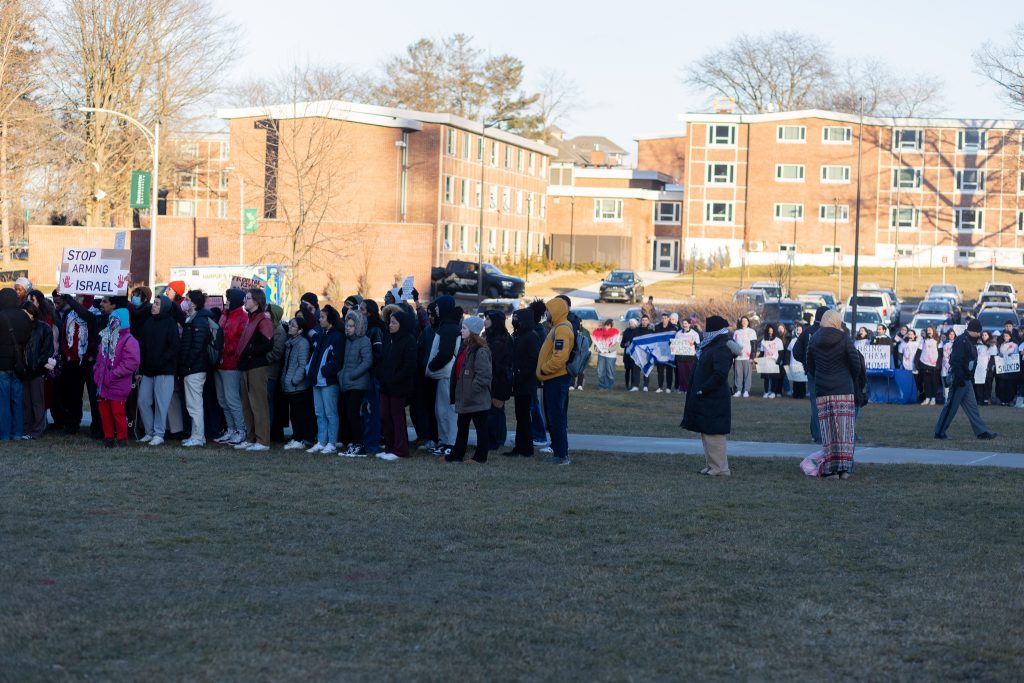On Valentine’s Day, over 200 community and campus activists came together for a “Free My Palestine” rally on Binghamton University’s Peace Quad.
The event was organized by the Binghamton Solidarity Committee, an independent group, and began at 4:45 p.m. Participants were asked to wear red and bring signs in protest of Israel’s intensifying military campaign in Gaza. Silent counter-protesters, led by Binghamton University’s Zionist Organization (BUZO), arrived shortly before the rally started and stayed for about an hour.
Rally participants were led in chants, including “down down with occupation, up up with liberation,” “not another nickel, not another dime, no more money for Israel’s crimes” and “no justice, no peace.” They called out President Joe Biden and Israeli Prime Minister Benjamin Netanyahu for their roles in the worsening humanitarian crisis in Gaza, which has drawn increasing international concern.
“People must confront this reality, and they should not be given a choice in the matter,” the Binghamton Solidarity Committee wrote in a statement. “Let their traffic be disrupted. Let their eyes be assaulted with flyers, their ears with chants. Even if they walk away, their unconscious will not be able to escape it, and with enough might it will plague their consciousness too.”
Multiple students held signs that read “All Eyes on Rafah,” referencing the city near Gaza’s southern border with Egypt. In October, the Israeli government ordered civilians in Gaza’s north to evacuate south in anticipation of its military’s ground assault. The city, the last designated “safe zone” for Palestinian civilians, houses an estimated 1.4 million displaced Gazans and was recently bombed by the Israel Defense Forces.
An imminent ground invasion in the south of Gaza has drawn concerns from Biden and top United States officials, who have largely supported Israel in recent months.
One of the rally’s first speakers read a poem, “If I Must Die,” aloud. Written by Refaat Alareer, a Palestinian professor and activist who was killed by an Israeli airstrike in December, the poem begins “If I must die, you must live to tell my story.”
The committee included a list of demands for the University, including implementing Boycott, Divestment and Sanctions (BDS) on campus, creating a Palestinian Studies department, extending protection to Arab students in the face of doxxing and harassment, ending study abroad programs in Israel and upholding an academic and cultural boycott of Israeli universities.
In a chant, protestors specifically accused University President Harvey Stenger of being complicit in the growing humanitarian crisis. A University spokesperson did not provide comment.
Campus police officers formed a line down the center of the Peace Quad separating rally-goers and counter-protestors — who silently held Israeli flags and signs calling for the return of the about 100 hostages still held by Hamas, and many placed pieces of black duct tape over their mouths.
Saul Hakim, BUZO’s president and a junior double-majoring in Judaic studies and political science, said that the decision to attend the protest was influenced by multiple factors, including as a direct response to the protest, to raise awareness about the hostages and to reaffirm their Zionist values.
The silent protest also served as a response to a recent Pipe Dream opinion column that has since drawn intense backlash. He added that they wanted the demonstration to serve as a platform for Israeli victims of sexual violence — several students wore shirts reading “#MeToo, unless you’re a Jew.”
“We aimed to assert that, while we uphold the First Amendment rights, our student body will not passively watch external entities propagate their agenda on our campus and make demands that affect our student body, especially as it relates to this issue which is so close to our hearts,” Hakim wrote. “Through visual symbols like posters, taped mouths [and] the wearing of black and yellow ribbons, we aimed to bring attention to all individuals still unaccounted for.”
A few community members, not affiliated with BUZO, also attended, chanting to “release the hostages” and to “free Gaza from Hamas.” They referred to pro-Palestinian demonstrators as “Nazis.”
Organizers called for the University to sever ties with the Israeli army’s suppliers, including Lockheed Martin and BAE Systems. BU’s Thomas J. Watson School of Engineering and Applied Science has a corporate student partnership with Lockheed Martin and BAE Systems for senior-year capstone projects, with both companies also offering scholarships as well.
“I used to be proud of being part of the premier public university in the state of New York,” a speaker said. “I was proud of the culture that I shared with other students. The Watson [College] to Lockheed Martin pipeline must end. We have talented engineers here at [BU], and instead of investing in public works and infrastructure, we send them straight to the war machine.”
The rally ended with a march to the Couper Administration Building, where demonstrators left their signs in front of the doors. They then marched past the Admissions Center and back through the University Union.
Aviva Friedman ‘14, a former Working Families Binghamton City councilmember who spoke at the rally, mentioned her Jewish background, emphasizing that she is not a Zionist.
“The Israeli government is doing despicable, reprehensible and indefensible things,” Friedman said. “And as it turns out, genocide does not make people righteous. It just makes people suffer. They told us to never forget. They told us to never forget, and Israel is acting as though we have forgotten.”
As of 10:02 a.m. on Feb. 15, the Israeli military campaign has killed over 28,663 Palestinians, according to PBS. Of the impending attack on Rafah, a United Nations official warned of a slaughter.
“My roommate walks around the house saying it’s not the eyes that are blind but the heart,” a speaker said. “It’s not a matter of being ignorant or unaware. It’s a matter of sensitivity to suffering and the respect for the sanctity of life.”



